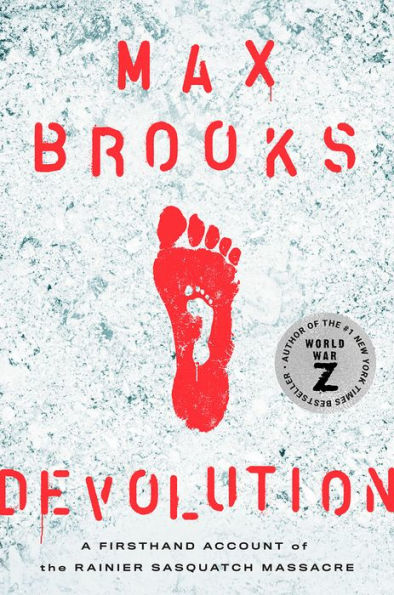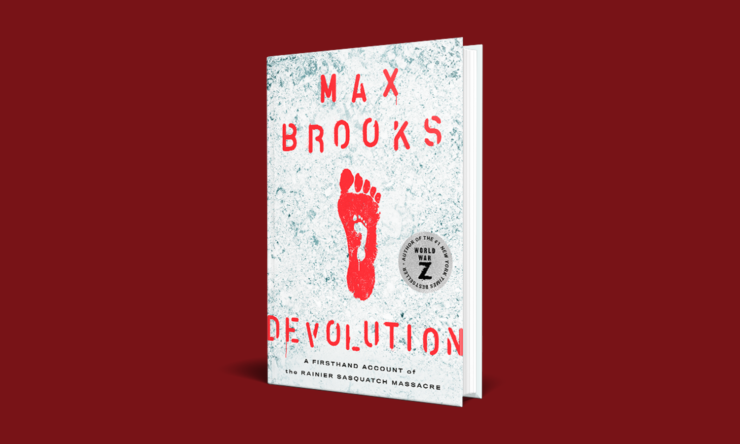It would have been easy for Max Brooks’s World War Z to feel gimmicky. An oral history of a worldwide zombie apocalypse? There are many, many places where that could have gone wrong. Instead, what Brooks created succeeded on a host of levels, from the geopolitical to the horrific. It balanced big-picture momentum with a few fantastic setpieces; via its framing device, it also allowed Brooks to present a bold vision of what the world might look like after such an outbreak was contained.
On paper, Brooks’s followup has more than a few things in common with World War Z. Like its predecessor, Devolution: A Firsthand Account of the Rainier Sasquatch Massacre is presented as a found document. Like its predecessor, it involves humans coming into conflict with something uncanny. And, like its predecessor, its structure offers plenty of foreshadowing of discomfiting events. But Devolution differs from World War Z in a few substantial ways as well, which ultimately make it a more intimate book than its predecessor—and a far stranger one.
The bulk of the narrative comes from the journal of one Kate Holland, with additional interviews and annotations by an unnamed writer. From the early pages, Brooks offers a broad outline of what’s to come. Holland was one of the residents of an “isolated, high-end, high-tech eco-community of Greenloop.” We’re told that Mount Rainier erupts, leading to chaos in the Pacific Northwest—for humans and non-humans alike. The introduction alludes to “a troop of hungry, apelike creatures” who would soon attack Greenloop.
All of that information gives the narrative the sort of doomed intensity of the best disaster movies. Greenloop itself, designed to be isolated in nature but also easy for its affluent residents to access Seattle, plays out like a lightly satirical take on Elon Musk-style futurism. Once the eruption hits and the community’s members find themselves isolated in ways they never expected, Brooks balances the more satirical elements of the situation with keen attention to the unique methods such a community would use to survive.
Buy the Book


Devolution: A Firsthand Account of the Rainier Sasquatch Massacre
Being cut off from civilization is but one struggle that the residents of Greenloop must face. Kate’s journal includes allusions to strange sounds heard at night, and massive shadowy figures seen in the distance. The reader knows what’s coming, which means that the plot has more than a little horror movie in its DNA. We’re introduced to a disparate group with their own rivalries and shifting dynamics; as anyone who’s seen a horror movie knows, we’re about to see most of these people meet terrible fates.
Interspersed with the Kate Holland narrative are interviews conducted with experts in the field and people with ties to Greenloop’s residents. It’s here that Brooks offers a glimpse into Devolution’s larger worldbuilding: namely, the idea that the sasquatches (or Bigfoots? Bigfeet?) that attacked Greenloop represent a species that evolved concurrently to humanity, and which have developed a keen ability to hide themselves away from human civilization.
The novel’s title, then, comes from the notion that the extreme circumstances of the volcanic eruption pushed the sasquatches to adopt more violent behavior—effectively devolving into a more base state. As the plot develops, the human characters find themselves relying less and less on technology and using more and more brutal tactics—meaning, essentially, that devolution works both ways.
In showing humans pitted against a close evolutionary relative in a desperate attempt at survival, Brooks offers a bleak view of the world. It’s telling that neither side—human or sasquatch—suggests cooperating to save both communities. Throughout the book, Brooks makes allusions to areas around the globe where neighboring populations have gone to war, including a passing reference to the Balkans in the 1990s and another character looking back on their time in the IDF.
But Brooks’s ambitious take on human (and primate) nature sometimes balances unsteadily with the smaller details of life in Greenloop, including a few odd pop culture references. When Devolution shows a wider canvas—even a secret history of the world—it works brilliantly, and the scenes of two species each fighting for their life abound with harrowing moments. But there are times where the intimate scale of this novel feels at odds with some of Brooks’s larger thematic points. As compelling as it is, you might find yourself wishing he’d opted to tell this story using a larger canvas.
Devolution is available from Del Rey.
 Tobias Carroll is the managing editor of Vol.1 Brooklyn. He is the author of the short story collection Transitory (Civil Coping Mechanisms) and the novel Reel (Rare Bird Books).
Tobias Carroll is the managing editor of Vol.1 Brooklyn. He is the author of the short story collection Transitory (Civil Coping Mechanisms) and the novel Reel (Rare Bird Books).











I mostly enjoyed this book. I agree, it wasn’t life changing, but I started off somewhat pessimistic based on early reviews, and eventually found that I liked it by and large. I agree with Carroll’s review, I thought some of the Sasquatch lore was well developed and those pieces really are nice little bits of intrigue that reminded me of some of my favorite parts of WWZ. Brooks seems to like shining a light for a second on something tantalizing but never giving it away. As for the character arcs, I’m still on the fence, but I will say, several days, later, that when I think over the book again, I feel it was worth my time.
I liked the smaller, more intimate canvas, especially in this period of current events, where we’re already tracking global disasters writ large. The comparison to World War Z is natural to make, but the form and scope of this story felt more like Michael Crichton’s Jurassic Park. A high-tech, remote facility intended for “civilians.” A natural disaster that exposes risks that were not accounted for. Animals and humans brought into unnatural proximity. Humans stripped of the advantages that put them at the top of the food chain. Irreconcilable conflict. And of course a set of mouthpiece characters who make sure the audience understand the themes, and What Went Wrong.
I, too, struggled with the “clash of civilizations” thesis in this story. With regard to the animal world, Max Brooks said that the inspiration was David Baron’s book, The Beast in the Garden, about mountain lions following deer into human habitation, losing their fear of human beings, and learning to prey on us. But the references you mention–and one of the possible conclusions–clearly nod to a wider, much bleaker view, a kill-or-be-killed dynamic.
When Devolution shows a wider canvas—even a secret history of the world—it works brilliantly, and the scenes of two species each fighting for their life abound with harrowing moments. But there are times where the intimate scale of this novel feels at odds with some of Brooks’s larger thematic points.
Agreed with both points of this – the secret history aspect was great.
And someone needs to tell Brooks to stop trying to write non-American characters. His Israeli voices in WWZ seemed OK, though I’m not Israeli, but both his Brits in WWZ and his Bosnian in Devolution felt pretty pasteboard.